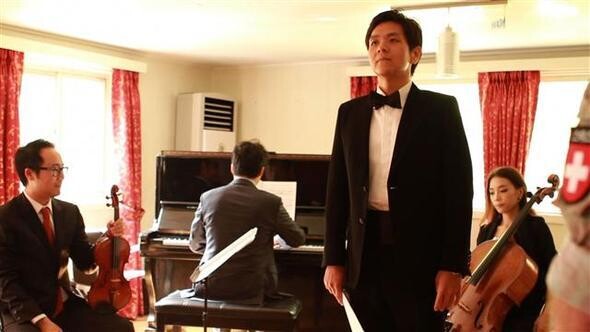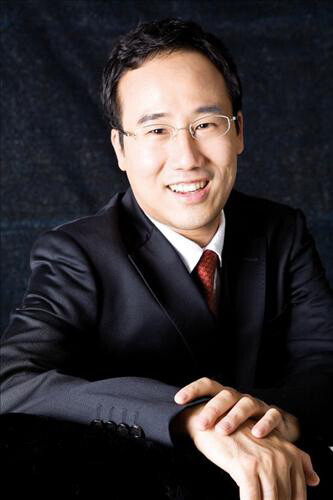hankyoreh
Links to other country sites 다른 나라 사이트 링크
Can an inter-Korean orchestra come together in harmony?

By Son Jun-hyun, senior staff writer
“For an orchestra to work, you’ve got to have your ears open. It’s not just about the sound you’re making - you have to hear what others are doing if you’re going to produce harmony. It’s the same thing with relations between North and South Korea. When everybody’s just insisting on their own ideas, the result is discord. That’s what got me thinking about how the two sides could create some harmony. What if we made an orchestra with North and South Korean musicians? After all, Daniel Barenboim was very up-front about his aims with his ‘West-Eastern Divan Orchestra,’ bringing together people from Israel and other countries in the Middle East.”

When Won Hyung-joon, CEO and founder of Lindenbaum Music Festival orchestra, first mentioned his idea for an inter-Korean youth orchestra, many called it an impossible dream. But it turned out to be not so impossible. First, the 39-year-old Won, a violinist, succeeded at getting the “impossible” Charles Dutoit, chief conductor of Britain’s Royal Philharmonic Orchestra, to serve as musical director to support the orchestra. Under Dutoit’s leadership, around 100 young South Korean musicians took the stage in 2009 at the first Lindenbaum Festival in Seoul.
Over the following five years, Won has worked overtime for the orchestra project. He was even given a date by North Korea for a Liberation Day joint performance in Pyongyang on Aug. 15, although it was later canceled as relations with Seoul went downhill.
In February 2013, Won went to Oxford University to give a talk emphasizing the orchestra’s importance. That October, a “peace recital” was held in Panmunjeom at the invitation of the Neutral Nations Supervisory Commission, though only the South Korean musicians played. Recently, plans for a performance in Germany that had been arranged by that country’s government for this October were also canceled when no North Korean channel could be obtained.
Won had been through years of hope and frustration when the Hankyoreh met him on Sept. 1. A Juilliard School graduate, he played with the Seoul Philharmonic at the age of ten and studied under greats like David Oistrakh. As director of the Lindenbaum Ensemble, he has worked to bring music to underserved areas like Hanawon, a resettlement center for North Korean refugees.
For all the ambition of his inter-Korean orchestra plans, Won himself was an absolute beginner. In a country with a strict National Security Law, he had no idea how to even go about contacting the proper people in North Korea. Still, after enough asking around he managed to find a way. In Feb. 2011, he met with Tae-bum Baek, the Korean-American who heads the Bel Canto Institute in Pyongyang, and passed along a video showing the orchestra’s progress. The video was soon forwarded to the North Korean permanent mission to the United Nations; less than a month later, a formal invitation had been issued by North Korea’s Ministry of Culture. That June, Dutoit visited Pyongyang and received a definite go-ahead on an Aug. 15 performance in Pyongyang. Suddenly, the impossible dream seemed in reach.
But the chill in inter-Korean relations would prove a more formidable obstacle than prejudice. First, the ROKS Cheonan, a South Korean warship, sank in a suspected North Korean torpedo attack in 2010. Then an email arrived from the North Korean UN mission saying the military was “upset” because of the Ulchi military exercises that would be going on the day after the performance. The performance was delayed, then finally cancelled. Was it all over? Won’s efforts all seemed to be in vain.
But he did not give up. Speaking in Feb. 2013 before the Oxford Union, Oxford University’s debate club, he drew parallels with the experience of a popular British musician.
“Did you see the faces on the judges and the audience when Paul Potts said at his audition [for the show ‘Britain’s Got Talent’] that he was a salesman at a cell phone store?” Won asked. “But the moment he started singing, that barrier between him and the audience crumbled away, and they shared a communion of emotion through music. I believe the power of music can bring about positive feelings between North and South. To make that happen, we first need to reach out to the young people who represent the future of a unified Korea.”
The song “The Impossible Dream” appears in “Man of La Mancha,” a musical based on the story of Don Quixote. The belief that even impossible dreams can come true - that’s what keeps encouraging Won Hyung-joon. Forming an inter-Korean orchestra requires approval from both sides. This means he has to work constantly to persuade both sides of the need for one. As he continues naming times and places, it’s up to Seoul and Pyongyang to consider them. For the moment, he’s planning another call on the South Korean Ministry of Unification.
Please direct questions or comments to [english@hani.co.kr]

Editorial・opinion
![[Column] Is Korean democracy really regressing? [Column] Is Korean democracy really regressing?](https://flexible.img.hani.co.kr/flexible/normal/500/300/imgdb/original/2024/0705/2917201664129137.jpg) [Column] Is Korean democracy really regressing?
[Column] Is Korean democracy really regressing?![[Column] How tragedy pervades weak links in Korean labor [Column] How tragedy pervades weak links in Korean labor](https://flexible.img.hani.co.kr/flexible/normal/500/300/imgdb/original/2024/0703/8717199957128458.jpg) [Column] How tragedy pervades weak links in Korean labor
[Column] How tragedy pervades weak links in Korean labor- [Column] How opposing war became a far-right policy
- [Editorial] Korea needs to adjust diplomatic course in preparation for a Trump comeback
- [Editorial] Silence won’t save Yoon
- [Column] The miscalculations that started the Korean War mustn’t be repeated
- [Correspondent’s column] China-Europe relations tested once more by EV war
- [Correspondent’s column] Who really created the new ‘axis of evil’?
- [Editorial] Exploiting foreign domestic workers won’t solve Korea’s birth rate problem
- [Column] Kim and Putin’s new world order
Most viewed articles
- 110 days of torture: Korean mental patient’s restraints only removed after death
- 2Months after outcry over “torture devices,” Justice Ministry proposes more restraints for immigratio
- 3Beleaguered economy could stymie Japan’s efforts to buoy the yen
- 4[Column] Is Korean democracy really regressing?
- 5Koreans are getting taller, but half of Korean men are now considered obese
- 6[Column] How tragedy pervades weak links in Korean labor
- 7Former bodyguard’s dark tale of marriage to Samsung royalty
- 8Real-life heroes of “A Taxi Driver” pass away without having reunited
- 9[Editorial] Exploiting foreign domestic workers won’t solve Korea’s birth rate problem
- 10Democrats ride wave of 1M signature petition for Yoon to be impeached